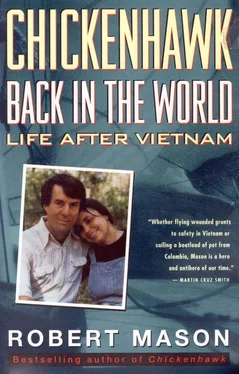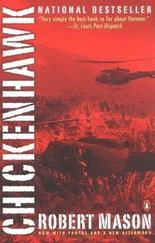Robert Mason - Chickenhawk - Back in the World - Life After Vietnam
Здесь есть возможность читать онлайн «Robert Mason - Chickenhawk - Back in the World - Life After Vietnam» весь текст электронной книги совершенно бесплатно (целиком полную версию без сокращений). В некоторых случаях можно слушать аудио, скачать через торрент в формате fb2 и присутствует краткое содержание. Год выпуска: 2013, Издательство: BookBaby, Жанр: Старинная литература, на английском языке. Описание произведения, (предисловие) а так же отзывы посетителей доступны на портале библиотеки ЛибКат.
- Название:Chickenhawk: Back in the World - Life After Vietnam
- Автор:
- Издательство:BookBaby
- Жанр:
- Год:2013
- ISBN:нет данных
- Рейтинг книги:3 / 5. Голосов: 1
-
Избранное:Добавить в избранное
- Отзывы:
-
Ваша оценка:
- 60
- 1
- 2
- 3
- 4
- 5
Chickenhawk: Back in the World - Life After Vietnam: краткое содержание, описание и аннотация
Предлагаем к чтению аннотацию, описание, краткое содержание или предисловие (зависит от того, что написал сам автор книги «Chickenhawk: Back in the World - Life After Vietnam»). Если вы не нашли необходимую информацию о книге — напишите в комментариях, мы постараемся отыскать её.
Chickenhawk: Back in the World - Life After Vietnam — читать онлайн бесплатно полную книгу (весь текст) целиком
Ниже представлен текст книги, разбитый по страницам. Система сохранения места последней прочитанной страницы, позволяет с удобством читать онлайн бесплатно книгу «Chickenhawk: Back in the World - Life After Vietnam», без необходимости каждый раз заново искать на чём Вы остановились. Поставьте закладку, и сможете в любой момент перейти на страницу, на которой закончили чтение.
Интервал:
Закладка:
Floating down a river is one kind of adventure; it is another adventure to be confined with a childhood friend you haven’t seen for almost twenty years while you’re doing it. Except for the eclipse, Elliott and I had last been together when we went to California back in 1962. We had fun then, both young, wild, and unattached. He was dating Patience at that time, but she was in Philadelphia. We stayed in California for a year and drove my Chevy panel truck to New Orleans, where we parted company. In the intervening years, I’d gotten married, become a father, spent a year in combat, been a businessman, and was now, at thirty-eight, trying to get my midlife crisis together. Elliott, on the other hand, had lived in Haight-Ashbury and been a genuine hippie flower child until his father died. He’d been married and divorced, had a child, too. Now he was a rancher. He was a rancher like I was a writer: by proclamation. He had a lot of property and maybe a hundred head of cattle. He wore a cowboy hat, cowboy boots, and talked with a drawl like they were filming him in some goddamn movie. I liked this guy, but at the time, on that raft, me broke and him rich, Elliott was tough to deal with. We talked about everything, explored every avenue of mutual interest, only to find we didn’t have any mutual interests. Time and experience had changed us too much. We had a commonality of youthful experiences, but it would take more than a river trip to bring us up to date as men.
I have to say that we made that trip in a record-setting nine days. That’s one hundred seventy-five miles of winding river in nine days in a floating tent. As far as I know, no one, in a floating tent, has beaten that. When we got out at a town called Suwannee at the end of the river, Elliott and I were barely speaking. I called Patience to pick us up. Elliott and I had a quiet lunch.
He left a few days later, and it’s taken until recently for us to talk. We’re still working at being friends.
CHAPTER 11
June 1980—Patience was delivering newspapers in a new Volkswagen Rabbit we’d bought with help from her mother—an outright cash grant for a down payment is what it was. Patience left every morning at two and delivered a hundred and twenty papers along a hundred-mile country road, a routine that tortured cars until they broke, and numbed people senseless. She got home at seven or eight, tired, and slept until early afternoon. This went on seven days a week. It was a job for desperate people who couldn’t think clearly enough to apply their other talents.
I tried to ignore our situation. I worked on my robot book and worried about my Vietnam book. Knox had sent me a total of five rejection letters from houses like Putnam and Simon & Schuster. They all liked the writing, they said, but none of them thought people wanted to read about Vietnam. That the war was so useless that nobody even wanted to read about it. Then, of course, maybe these editors were just brushing me off because I couldn’t really write well enough.
I began to lose faith in myself. Until somebody bought something I wrote, I was just dreaming about being a writer. Patience was doing something to make money for us and I was doing nothing. In October I said, all right, fine, I’ll deliver newspapers, too.
The idea was that I could deliver papers at night and still write during the day. But getting that paper route was like falling into quick-sand. My nights were almost okay: a hundred miles of speeding down wild country roads in the Roach was a driving challenge. My days were spent recuperating from the trip. I was making enough money to survive, but I couldn’t write. The combination of an inverted day and a feeling of trapped desperation took its toll. My anxiety symptoms visited me with renewed vigor. I began to leap up out of bed more often. I was a nervous, cranky guy during the day, and at night I was a sullen and grim person on the route, pushing myself to make it faster, to make it end as soon as I could so I’d have time to think straight, get out of this trap. I drove like a fiend and could beat Patience back home by an hour or so.
I read about Bill Smith, who now called himself Martin Cruz Smith, in Newsweek . His Russian book, Gorky Park , was an outrageously huge best-seller. He’d become a millionaire. I was really happy for him, but too depressed to call.
I’m driving the last ten miles of my route. It is four in the morning. The moon is flickering through the overhead branches that form a canopy over a lonely road somewhere near the edge of the planet. I come into a turn I know by heart and feel the car do a sickening twist, a mind-bending wrench. I feel my breath burst in surprise as the road, striped and dappled with moonlight, rises up before me like a wall. I jam on the brakes, slide to a stop, and open the door. I have to hang on to the car. I shake my head, trying to snap out of It. But It isn’t having any part of being snapped out of. I’m reeling through space, falling into It. I’m dying.
The wall finally flops down, becomes a road again. I am still reeling, sickeningly dizzy, but I crank up the Roach and drive, driving like I used to fly instruments in helicopters. You learn to trust the instruments and not the seat of your pants when you get into bad weather. I am in the midst of a mind-storm.
Somehow I make it home. Patience is still out on her route. Jack is asleep in the bus. I call my Vietnam-veteran neighbor, John Tillerman. Tell him I’m fucked up, dizzy as a loon in a tornado. Just saying that helps, and though he offers to help, I say I can make it to the VA hospital. Leave a note for Patience and Jack.
I get to the VA before dawn, fully expecting to be greeted with cheers for the harrowing thing I’ve just done, what with driving twenty-five miles as fucked up as I was, and all. Even before dawn, the VA is never caught off guard. They’re professional. They wave my complaints aside and tell me to have a seat. I tell them it might be prudent to have a doctor see me before the fucking symptoms go away. We might actually be able to fucking find out what’s fucking wrong, but they reaffirm the importance of sitting. One sits in the VA; it is one’s fucking duty.
I sit.
By ten o’clock, the dizzy spell has gone. I’m so angry when I see a physician’s assistant that tears dribble from my eyes while I snivel about my scary ride through the Valley of Death. She commiserates. Actually, she gets mad and makes a scene with the clerks who have had me sitting out in the waiting area for four hours. But it’s too late, and no one ever diagnoses what happened to me that night.
Bad luck comes in bunches, like troupes of sideshow freaks. No longer dizzy, I hit the roads for a few more days before the Roach—the car I bought in Luxembourg twelve years before when it was already fifteen years old—goes rubba-rubba-clunk one night, and dies.
Damn, I have a paper route to route! People depend on me for their news, here. I go to the local Rent-A-Wreck place and rent a wreck—these guys don’t lie—that looks bad enough to get you arrested in any decent crime-watch neighborhood.
I forge ahead. The wreck isn’t just ugly and loose and dangerous, it sucks down gas faster than I can buy it. It only takes a couple of trips for me to realize I am losing money each day. Frantic calls to mechanics all over Gainesville prove futile. The Roach is dead and only transplants from Germany will bring it back to life.
In an embarrassing panic, I call Elliott in Montana. I tell him the deal, ask him to lend me a couple of thousand to put down on a new car. Elliott is silent for a while. I can hear him swallowing as he composes an answer to a deadbeat friend, a monkey’s paw grasping for money—the guy he had nothing in common with, stuck in a tent on a river for two fucking weeks; that guy. “Damn, Bob. You caught me right in the middle of fixing my road. Afraid I can’t help you, buddy.” Sweep, sweep. That hurt. I figure if an old friend who has plenty of bucks won’t help me out, then who will?
Читать дальшеИнтервал:
Закладка:
Похожие книги на «Chickenhawk: Back in the World - Life After Vietnam»
Представляем Вашему вниманию похожие книги на «Chickenhawk: Back in the World - Life After Vietnam» списком для выбора. Мы отобрали схожую по названию и смыслу литературу в надежде предоставить читателям больше вариантов отыскать новые, интересные, ещё непрочитанные произведения.
Обсуждение, отзывы о книге «Chickenhawk: Back in the World - Life After Vietnam» и просто собственные мнения читателей. Оставьте ваши комментарии, напишите, что Вы думаете о произведении, его смысле или главных героях. Укажите что конкретно понравилось, а что нет, и почему Вы так считаете.












